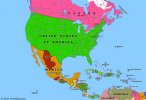…While few could have predicted what would follow, commentators at the time saw that the 1916 election was different. America was not as much of a stranger to political violence as it liked to believe, but it was much more widespread this time. In large part, this was because for the first time perhaps since the Civil War, the violence was not one way. KKK rallies were met with gangs of Sollies. Corporate security meant to intimidate workers found themselves in armed standoffs – and, increasingly, actual gunfights – with the Committees of Public Safety…
…Sadly, although the majority of violence by the IWW and SLP can be characterized as defensive in nature, not all of it was. In IWW strongholds like Milwaukee, Seattle, and Pittsburgh, posters warning of dire consequences for those who “betrayed the working class” by voting for Wilson or Root were common. Republican and Democratic campaign offices were regularly vandalized…
…The violence of 1916 has often been portrayed as the IWW versus the Ku Klux Klan. It is indeed true that the KKK was the most common instigator of violence (political violence being their raison d’etre), and the IWW provided a natural means of organizing against this. However, there were far more factions involved, and the sides were not always clear. Fearing a possible socialist takeover, mine and factory bosses tried to intimidate their employees into voting for their preferred candidates, or simply not voting at all. In numerous cases, sites which had been designated for voting were bought out by bosses (often under threat of violence) or even burned to the ground. Committees of Public Safety fought back where they could. In San Francisco, rumors that Asian immigrants had illegally registered to vote provoked race riots…
…This violence naturally prompted protective measures. All three major party conventions – the Republican convention in Boston[1], the Democratic convention in St. Louis, and the Socialist convention in Milwaukee[2] – had security provided by the National Guard. Most politicians and political candidates had bodyguards. Outside of the states and cities where the SLP was already in power and could mobilize police or the National Guard, the IWW provided socialist candidates with security. As these guards were generally only identifiable by their red armbands, they soon became known as the Red Guards…
- From 1916: The Tinder Year by Barbara Tuchman
[1] IOTL, the 1916 Republican Convention was held in Chicago (as were the 1904, 1908, 1912, and 1920 Republican Conventions). Concerns over rising socialist influence in the city lead the Republicans to move theirs to the relatively moderate Boston.
[2] IOTL, the SPA conducted their convention by mail. ITTL, the SLP does so in Milwaukee, under the protection of Governor Seidel.
